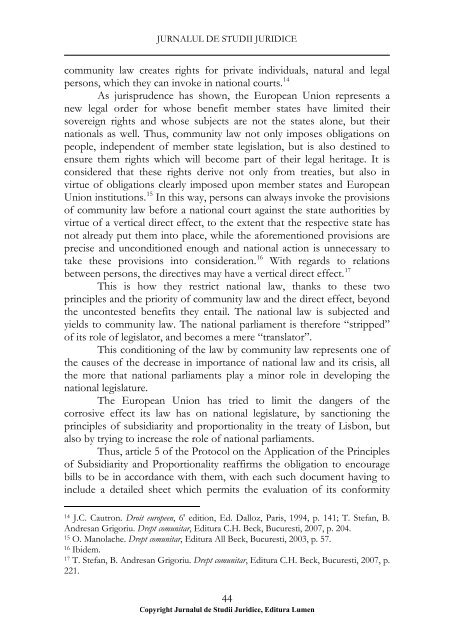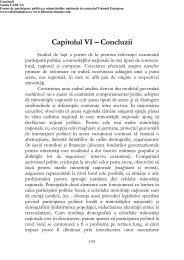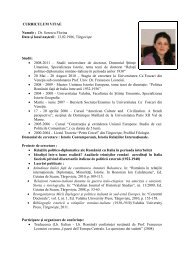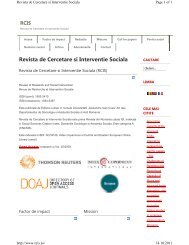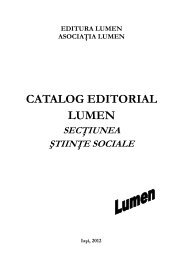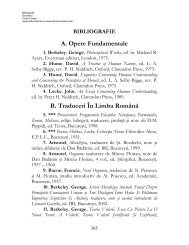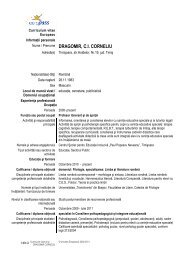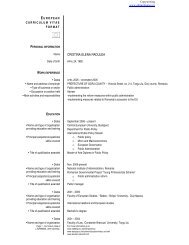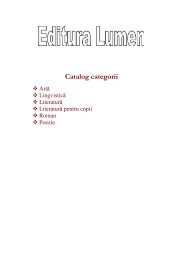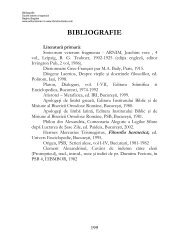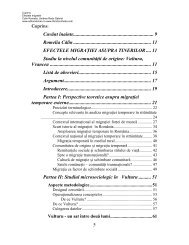- Page 3 and 4: Jurnalul de Studii JuridiceJournal
- Page 5 and 6: Călina JUGASTRU, Professor Ph. D &
- Page 7 and 8: Aims and Scope:Journal of Legal Stu
- Page 9 and 10: CONTENTS:Top highlights of the Jour
- Page 11 and 12: literatura de specialitate; să con
- Page 13 and 14: The Agenda of International Confere
- Page 15 and 16: ContentsKeynotes speakersI.Comunity
- Page 17 and 18: Copyright Jurnalul de Studii Juridi
- Page 19 and 20: The Role of the Committees and of t
- Page 21 and 22: Is the Romanian Rule of Law Jeopard
- Page 23 and 24: Copyright Jurnalul de Studii Juridi
- Page 25 and 26: JURNALUL DE STUDII JURIDICE1. Intro
- Page 27 and 28: JURNALUL DE STUDII JURIDICEurmător
- Page 29 and 30: JURNALUL DE STUDII JURIDICEarticolu
- Page 31 and 32: JURNALUL DE STUDII JURIDICE- alinie
- Page 33 and 34: JURNALUL DE STUDII JURIDICEcomise
- Page 35 and 36: JURNALUL DE STUDII JURIDICE- acest
- Page 37 and 38: JURNALUL DE STUDII JURIDICEmăsurii
- Page 39 and 40: JURNALUL DE STUDII JURIDICE1. Intro
- Page 41 and 42: JURNALUL DE STUDII JURIDICElaw 4 .
- Page 43: JURNALUL DE STUDII JURIDICEEuropean
- Page 47 and 48: JURNALUL DE STUDII JURIDICEconclude
- Page 49 and 50: Copyright Jurnalul de Studii Juridi
- Page 51 and 52: JURNALUL DE STUDII JURIDICE1. Organ
- Page 53 and 54: JURNALUL DE STUDII JURIDICEUn alt e
- Page 55 and 56: JURNALUL DE STUDII JURIDICEconsilie
- Page 57 and 58: JURNALUL DE STUDII JURIDICEmartie 2
- Page 59 and 60: JURNALUL DE STUDII JURIDICEBarnier,
- Page 61 and 62: JURNALUL DE STUDII JURIDICEde parti
- Page 63 and 64: JURNALUL DE STUDII JURIDICEcetăţe
- Page 65 and 66: JURNALUL DE STUDII JURIDICEArticole
- Page 67 and 68: JURNALUL DE STUDII JURIDICE1. Drept
- Page 69 and 70: JURNALUL DE STUDII JURIDICEJustiţi
- Page 71 and 72: JURNALUL DE STUDII JURIDICEconformi
- Page 73 and 74: JURNALUL DE STUDII JURIDICEÎn prim
- Page 75 and 76: JURNALUL DE STUDII JURIDICE8. Schem
- Page 77 and 78: JURNALUL DE STUDII JURIDICETabel -
- Page 79 and 80: JURNALUL DE STUDII JURIDICECauze af
- Page 81 and 82: JURNALUL DE STUDII JURIDICEÎn schi
- Page 83 and 84: JURNALUL DE STUDII JURIDICEÎn obse
- Page 85 and 86: JURNALUL DE STUDII JURIDICEConsiliu
- Page 87 and 88: JURNALUL DE STUDII JURIDICEtrasarea
- Page 89 and 90: JURNALUL DE STUDII JURIDICEmateria
- Page 91 and 92: JURNALUL DE STUDII JURIDICEReferenc
- Page 93 and 94: JURNALUL DE STUDII JURIDICEIntroduc
- Page 95 and 96:
JURNALUL DE STUDII JURIDICEanomalie
- Page 97 and 98:
JURNALUL DE STUDII JURIDICEnecesare
- Page 99 and 100:
JURNALUL DE STUDII JURIDICEIntrodus
- Page 101 and 102:
JURNALUL DE STUDII JURIDICE37), car
- Page 103 and 104:
JURNALUL DE STUDII JURIDICERolul co
- Page 105 and 106:
JURNALUL DE STUDII JURIDICElegislat
- Page 107 and 108:
JURNALUL DE STUDII JURIDICEtermen d
- Page 109 and 110:
JURNALUL DE STUDII JURIDICELegisla
- Page 111 and 112:
JURNALUL DE STUDII JURIDICE1.Conţi
- Page 113 and 114:
JURNALUL DE STUDII JURIDICEintermed
- Page 115 and 116:
JURNALUL DE STUDII JURIDICECapitolu
- Page 117 and 118:
JURNALUL DE STUDII JURIDICErestitui
- Page 119 and 120:
JURNALUL DE STUDII JURIDICEpe care
- Page 121 and 122:
JURNALUL DE STUDII JURIDICEReferenc
- Page 123 and 124:
Copyright Jurnalul de Studii Juridi
- Page 125 and 126:
Copyright Jurnalul de Studii Juridi
- Page 127 and 128:
JURNALUL DE STUDII JURIDICECodul a
- Page 129 and 130:
JURNALUL DE STUDII JURIDICEsocială
- Page 131 and 132:
JURNALUL DE STUDII JURIDICEindepend
- Page 133 and 134:
JURNALUL DE STUDII JURIDICEritm inf
- Page 135 and 136:
JURNALUL DE STUDII JURIDICEnumai pr
- Page 137 and 138:
JURNALUL DE STUDII JURIDICEraţiuni
- Page 139 and 140:
JURNALUL DE STUDII JURIDICEde aprop
- Page 141 and 142:
JURNALUL DE STUDII JURIDICEcivil de
- Page 143 and 144:
JURNALUL DE STUDII JURIDICENadaud,
- Page 145 and 146:
JURNALUL DE STUDII JURIDICE1.Noţiu
- Page 147 and 148:
JURNALUL DE STUDII JURIDICE2.Delimi
- Page 149 and 150:
JURNALUL DE STUDII JURIDICEoferă p
- Page 151 and 152:
JURNALUL DE STUDII JURIDICEpoate pr
- Page 153 and 154:
JURNALUL DE STUDII JURIDICEReferenc
- Page 155 and 156:
JURNALUL DE STUDII JURIDICEÎncheie
- Page 157 and 158:
JURNALUL DE STUDII JURIDICEunei alt
- Page 159 and 160:
JURNALUL DE STUDII JURIDICEreprezin
- Page 161 and 162:
JURNALUL DE STUDII JURIDICEdoar la
- Page 163 and 164:
JURNALUL DE STUDII JURIDICEun efort
- Page 165 and 166:
JURNALUL DE STUDII JURIDICEKocsis,
- Page 167 and 168:
JURNALUL DE STUDII JURIDICE1. Cadru
- Page 169 and 170:
JURNALUL DE STUDII JURIDICEexpresă
- Page 171 and 172:
JURNALUL DE STUDII JURIDICEluaţi
- Page 173 and 174:
JURNALUL DE STUDII JURIDICEregim de
- Page 175 and 176:
JURNALUL DE STUDII JURIDICELegea nr
- Page 177 and 178:
JURNALUL DE STUDII JURIDICEThe noti
- Page 179 and 180:
JURNALUL DE STUDII JURIDICEcertifie
- Page 181 and 182:
JURNALUL DE STUDII JURIDICEThe empl
- Page 183 and 184:
JURNALUL DE STUDII JURIDICEAlthough
- Page 185 and 186:
JURNALUL DE STUDII JURIDICEIn what
- Page 187 and 188:
JURNALUL DE STUDII JURIDICELaw no.
- Page 189 and 190:
Copyright Jurnalul de Studii Juridi
- Page 191 and 192:
JURNALUL DE STUDII JURIDICEFraudare
- Page 193 and 194:
JURNALUL DE STUDII JURIDICEcauză,
- Page 195 and 196:
JURNALUL DE STUDII JURIDICEcazurile
- Page 197 and 198:
JURNALUL DE STUDII JURIDICEmomentul
- Page 199 and 200:
JURNALUL DE STUDII JURIDICEdolul ci
- Page 201 and 202:
JURNALUL DE STUDII JURIDICEînseamn
- Page 203 and 204:
JURNALUL DE STUDII JURIDICEfi fost
- Page 205 and 206:
JURNALUL DE STUDII JURIDICETotuşi,
- Page 207 and 208:
JURNALUL DE STUDII JURIDICEacţiuni
- Page 209 and 210:
JURNALUL DE STUDII JURIDICELegisla
- Page 211 and 212:
JURNALUL DE STUDII JURIDICELa nivel
- Page 213 and 214:
JURNALUL DE STUDII JURIDICEReferenc
- Page 215 and 216:
JURNALUL DE STUDII JURIDICE1. The A
- Page 217 and 218:
JURNALUL DE STUDII JURIDICE2. Contr
- Page 219 and 220:
JURNALUL DE STUDII JURIDICEbusiness
- Page 221 and 222:
JURNALUL DE STUDII JURIDICENo. 59/1
- Page 223 and 224:
JURNALUL DE STUDII JURIDICEexpress
- Page 225 and 226:
JURNALUL DE STUDII JURIDICEsame law
- Page 227 and 228:
JURNALUL DE STUDII JURIDICEReferenc
- Page 229 and 230:
JURNALUL DE STUDII JURIDICEI. Intro
- Page 231 and 232:
JURNALUL DE STUDII JURIDICEintrafam
- Page 233 and 234:
JURNALUL DE STUDII JURIDICEDintre d
- Page 235 and 236:
JURNALUL DE STUDII JURIDICEde la si
- Page 237 and 238:
JURNALUL DE STUDII JURIDICEÎn vede
- Page 239 and 240:
JURNALUL DE STUDII JURIDICEmasă, C
- Page 241 and 242:
JURNALUL DE STUDII JURIDICE4. Ceea
- Page 243 and 244:
JURNALUL DE STUDII JURIDICEprima Re
- Page 245 and 246:
JURNALUL DE STUDII JURIDICEpriorit
- Page 247 and 248:
JURNALUL DE STUDII JURIDICEDecizia
- Page 249 and 250:
Copyright Jurnalul de Studii Juridi
- Page 251 and 252:
JURNALUL DE STUDII JURIDICE1. Consi
- Page 253 and 254:
JURNALUL DE STUDII JURIDICEantisoci
- Page 255 and 256:
JURNALUL DE STUDII JURIDICEPartidel
- Page 257 and 258:
JURNALUL DE STUDII JURIDICEÎn lite
- Page 259 and 260:
JURNALUL DE STUDII JURIDICEprocesul
- Page 261 and 262:
JURNALUL DE STUDII JURIDICEconştii
- Page 263 and 264:
JURNALUL DE STUDII JURIDICEdezechil
- Page 265 and 266:
JURNALUL DE STUDII JURIDICEsporeasc
- Page 267 and 268:
JURNALUL DE STUDII JURIDICEpoate re
- Page 269 and 270:
JURNALUL DE STUDII JURIDICEîn soci
- Page 271 and 272:
Copyright Jurnalul de Studii Juridi
- Page 273 and 274:
JURNALUL DE STUDII JURIDICE1. Print
- Page 275 and 276:
JURNALUL DE STUDII JURIDICEOr, în
- Page 277 and 278:
Copyright Jurnalul de Studii Juridi
- Page 279 and 280:
JURNALUL DE STUDII JURIDICEI. Intro
- Page 281 and 282:
JURNALUL DE STUDII JURIDICE„obiec
- Page 283 and 284:
JURNALUL DE STUDII JURIDICEpotenţi
- Page 285 and 286:
JURNALUL DE STUDII JURIDICEdiminuar
- Page 287 and 288:
Copyright Jurnalul de Studii Juridi
- Page 289 and 290:
Copyright Jurnalul de Studii Juridi
- Page 291 and 292:
JURNALUL DE STUDII JURIDICEIntroduc
- Page 293 and 294:
JURNALUL DE STUDII JURIDICE- etica
- Page 295 and 296:
JURNALUL DE STUDII JURIDICEacord ,
- Page 297 and 298:
JURNALUL DE STUDII JURIDICEconducă
- Page 299 and 300:
JURNALUL DE STUDII JURIDICEsubiectu
- Page 301 and 302:
JURNALUL DE STUDII JURIDICEun punct
- Page 303 and 304:
JURNALUL DE STUDII JURIDICEsocietă
- Page 305 and 306:
JURNALUL DE STUDII JURIDICEintroduc
- Page 307 and 308:
JURNALUL DE STUDII JURIDICEMoralita
- Page 309 and 310:
JURNALUL DE STUDII JURIDICEşi just
- Page 311 and 312:
JURNALUL DE STUDII JURIDICEc) Respo
- Page 313 and 314:
JURNALUL DE STUDII JURIDICEprofesio
- Page 315 and 316:
JURNALUL DE STUDII JURIDICENormativ
- Page 317 and 318:
JURNALUL DE STUDII JURIDICEFuller,
- Page 319 and 320:
Copyright Jurnalul de Studii Juridi
- Page 321 and 322:
JURNALUL DE STUDII JURIDICEIntroduc
- Page 323 and 324:
JURNALUL DE STUDII JURIDICEThe new
- Page 325 and 326:
JURNALUL DE STUDII JURIDICEstates t
- Page 327 and 328:
JURNALUL DE STUDII JURIDICEUSA have
- Page 329 and 330:
JURNALUL DE STUDII JURIDICE- people
- Page 331 and 332:
JURNALUL DE STUDII JURIDICEThe worl
- Page 333 and 334:
JURNALUL DE STUDII JURIDICEWoods, N
- Page 335:
Copyright Jurnalul de Studii Juridi


